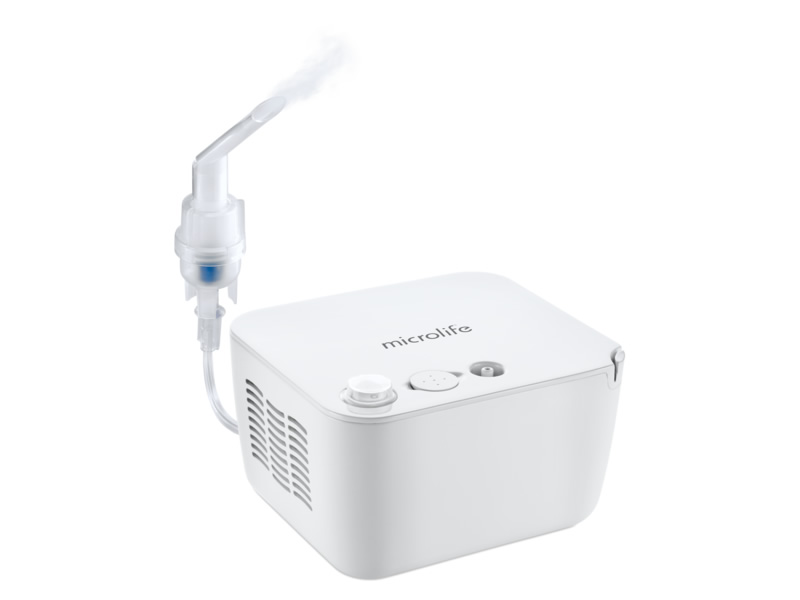Nebulized therapy is often called a breathing treatment. You can use nebulizers with a variety of medications.

What is a nebulizer?
A nebulizer is a device that changes medication from a liquid to a mist so you can inhale it into your lungs.
Also known as a breathing treatment, nebulizers help anyone who suffers from a respiratory problem overcome acute attacks and respiratory challenges quickly, effectively and easily. It is useful, especially in younger children, to treat upper and lower respiratory problems.
Types of nebulizers
Generally, there are three types of electronic nebulizers: the compressor, the ultrasonic and the mesh nebulizer.
Ultrasonic nebulizers are most often used in professional settings, whereas compressor and mesh nebulizers are considered suitable for home use.
Compressor nebulizers is powered by a compressed gas that flows at high speed through the liquid medicine to turn it into a mist. Also known as tabletop nebulizers, they are heavy and not meant to be carried around. Compressor nebulizers may be more suitable for patients preferring stationary use. They also require an electric outlet for operation.
Mesh nebulizers use electricity or ultrasonic wave. The liquid drug is pushed through a vibrating mesh/membrane with laser drilled hole, producing very fine droplets through the hole. Also known as handheld nebulizers it can operate on a battery power supply and is compact and portable compared to compressor nebulizers.
How to select the right nebulizer
- The whole point of nebulizers is they are the simple, easy way to get medication into the lungs. The device should therefore be simple, effective and easy to use.
- Choose a nebulizer that suits your needs. Certain types of nebulizers are more suitable than others for a specific application or setting e.g., professional vs home use.
- Noise level, especially at night for younger patients, should be considered.
- Where will it be used? Active patients requiring therapy throughout the day often prefers smaller and more portable devices.
- Who is the nebulizer for? Proper use helps to assure a complete dose; therefore, the patient’s capabilities play a role in selection. Children can pose a challenge; nebulizers in fun design can help remove the scary aspect of treatment.
- Treatment time. Quicker treatments may encourage adherence in patients.
- How often will it be used? If you need to use your nebulizers very frequently, you should choose a sturdy nebulizer with a high nebulizing effect, that is suitable for intensive use.
- Product warranty and durability. Always choose a nebuliser from a reputable manufacturer that offers a reasonable warranty.
- Consider the accessories included with the nebulizer. Look for kits that come with masks for different age groups (infants, children, and adults), as well as tubing and other necessary components. Some nebulizers may also come with carry cases or additional filters.
How to care for your nebulizer
- It’s important to clean and disinfect your nebulizer equipment to prevent infection and remove medication residuals.
- Carefully follow the cleaning and disinfecting instructions of the accessories as they are very important to the performance of the device and success of the therapy.
- Clean accessories in an area away from smoke, dust, and open windows.
- Before and after each treatment, rinse the nebulizer cup, mask and air-tube thoroughly with warm water, shaking off excess water, and let it air-dry.
- After use and cleaning, dip the nebulizer cup, mask and air-tube in boiling water for 5 minutes to disinfect them.
- Do not boil the nebulizer cup, air tube or mask.
- When storing, cover the compressor with a clean cloth. Use a soft and dry cloth with non-abrasive cleaners (when necessary) to clean the compressor.
- Follow the equipment manufacturer’s directions on checking and cleaning of the nebulizer air-filter.
- Do not try to clean the air filter for reuse.
- Only use original air filters.
- Do not use the device without an air filter.
- Follow the manufacturer’s care and maintenance instructions for the nebulizer and accessories.
Microlife offers a wide range of nebulizers suitable for a variety of applications. From specially designed for babies and toddlers use, to home use and high-performance use. Follow this link for more information on the various devices available.




